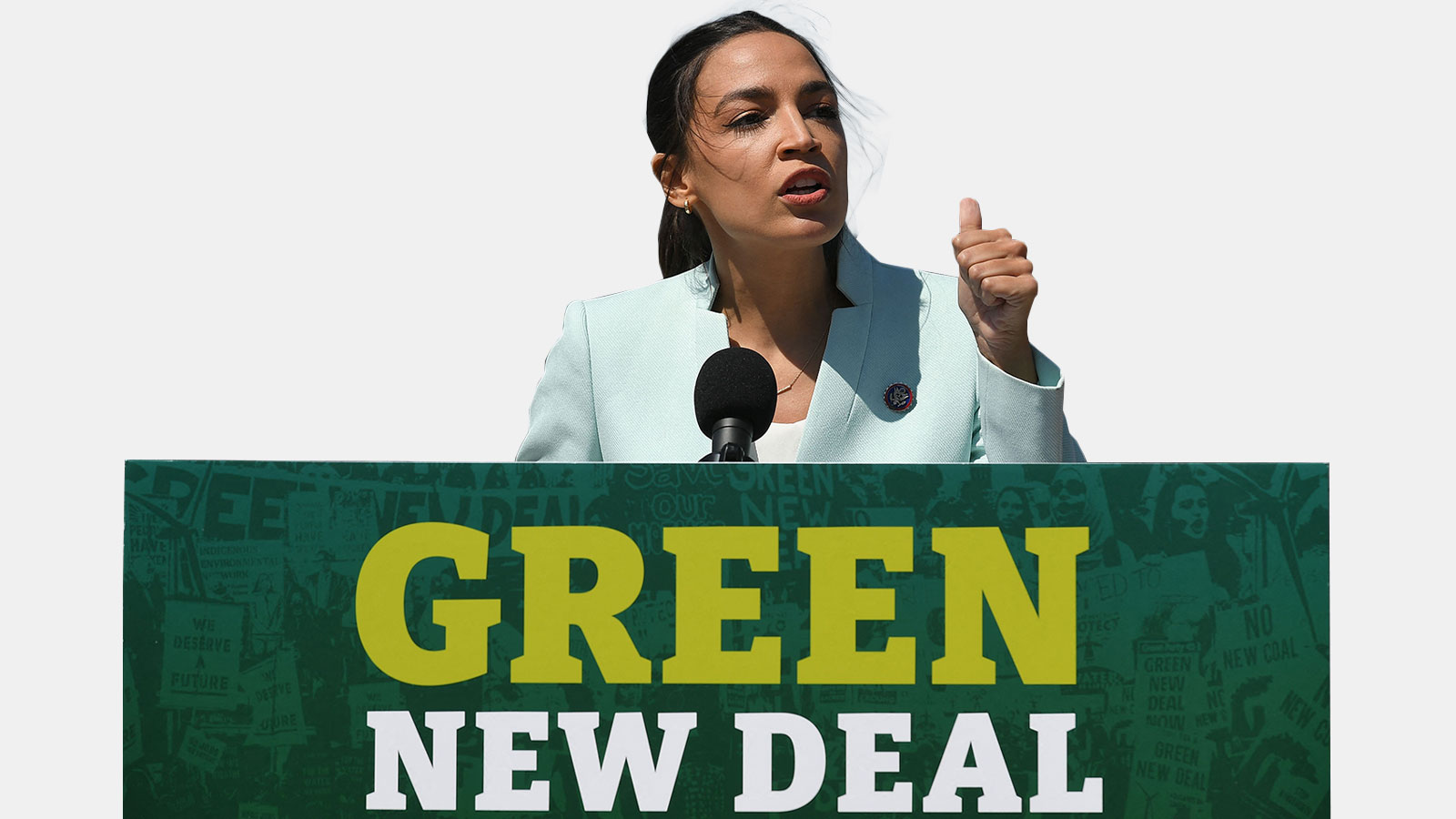As Congress considers the Biden administration’s $2 trillion climate and infrastructure proposal, progressive lawmakers are beginning to signal their vision of what it would take to, in the president’s words, “build back better.” On Monday, Democratic Representatives Cori Bush and Alexandria Ocasio-Cortez introduced the Green New Deal for Cities Act of 2021, which would distribute $1 trillion directly to cities, towns, and tribes over four years, allowing local governments to enact ambitious climate justice initiatives without buy-in from more conservative state legislatures. On top of that, on Tuesday Ocasio-Cortez and Senator Edward Markey reintroduced the joint resolution that first popularized the Green New Deal concept.
The cities bill introduced on Monday, which has been co-sponsored by 23 other Democrats, provides funding that can be spent on a range of environmental issues: replacing lead pipes, retrofitting water infrastructure, building bike lanes, installing electric vehicle charging stations, testing soil and water for contaminants, and phasing out fossil fuel infrastructure, among other options. It also “supports reparations programs for Black and Indigenous people and communities” to remediate historical environmental injustices, but the details of the program are not yet defined.
The bill’s environmental justice components are not limited to the reparations and project-based components. It also requires that hiring practices for new infrastructure projects “give preference to local hiring” and create opportunities for people of color, immigrants, women, and formerly incarcerated individuals. Projects would also be expected to support “housing stability” by requiring local governments work with community groups to prevent displacement, as a condition before receiving investment. Cities would be able to apply for funds for “Green New Deal Projects” on a project-by-project basis after they’ve met certain conditions. However, the bill does not stipulate how much funding can be allocated to individual cities or tribes.
The trillion-dollar investment, Representative Bush said in a press release, would “tackle the environmental injustices that are making us and our children sick, costing us our homes, and destroying our planet,” while creating hundreds of thousands of jobs in the process. “The desire for these investments is there,” Representative Ocasio-Cortez said in the press release, but cities lack the funding to make it happen on their own.
While the Green New Deal name and concept polls well among likely voters, the proposal’s bold provisions — particularly the reparations component — are likely to be non-starters with Republicans and less progressive Democrats. But Georgetown University Professor Olúfẹ́mi Táíwò, whose work focuses on environmental justice, argues that the bill signals a growing recognition that climate initiatives will have to empower local governments if they are going to circumvent political gridlock.
“Republicans control a large portion of the state legislatures, so it is notable to fund cities and towns directly — and shows the growing understanding of how powerfully state politics have been shaped by oil and gas interests,” Táíwò told Grist. “The more influence and power we give to communities over what happens in their lives, the better.”
Bush, who represents St. Louis, Missouri, ran for Congress with a message connecting her childhood struggles with environmental injustice to the effects of poverty, gun violence, and disinvestment on communities of color. She said that the bill was written with the help of dozens of environmental groups and prioritizes community voices over “false solutions” offered by the fossil fuel industry. The bill also explicitly bars money from being used to “green” law enforcement agencies, immigration detention centers, and prisons through funding projects like buying electric police vehicles. Funding would also be prohibited from supporting nuclear energy, a position likely to rankle those who argue that atomic power is a viable alternative to fossil fuels.
Another “false solution,” according to the bill, is the use of emerging technology to remove carbon from the atmosphere or to capture and store carbon from fossil fuel sites before it’s emitted in the first place. These methods, which are referred to as carbon removal and carbon capture and storage, have garnered bipartisan support as tools necessary to combat climate change. But some progressives worry that the technologies will give a lifeline to the fossil fuel industry and slow the transition to renewable energy sources.
“A lot of the money and interest in carbon removal is coming from oil and gas companies, tech companies, and even legislation lobbying groups like ALEC [the American Legislative Exchange Council], whose plans are financially motivated and not justice-oriented, which blur the effectiveness of these climate strategies,” said Táíwò, who nevertheless is a proponent of carbon removal.
“There’s no silver bullet, as they say, to beat the climate crisis,” Táíwò added. “It is going to take a lot of effort, so these bills that Bush and AOC are putting together — which are targeted, specific, and focused on the individual things that we need to do to tackle the climate crisis, while supporting Black and Indigenous communities — are very important.”



